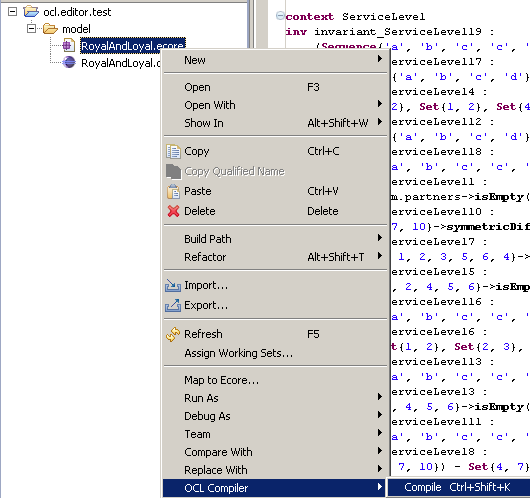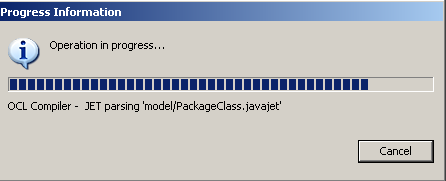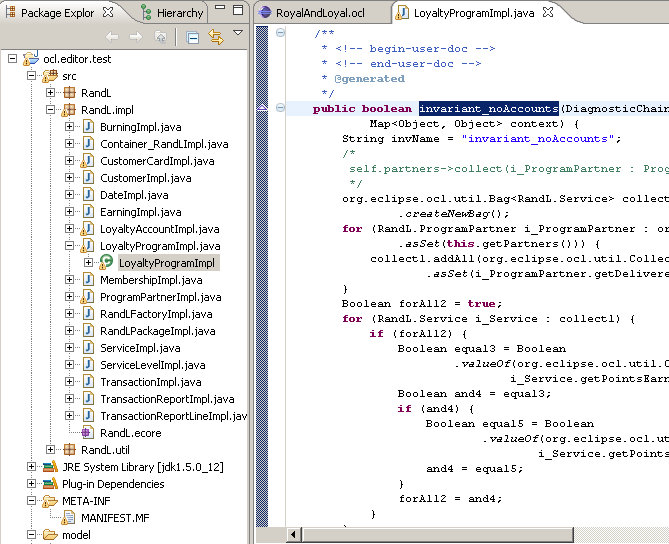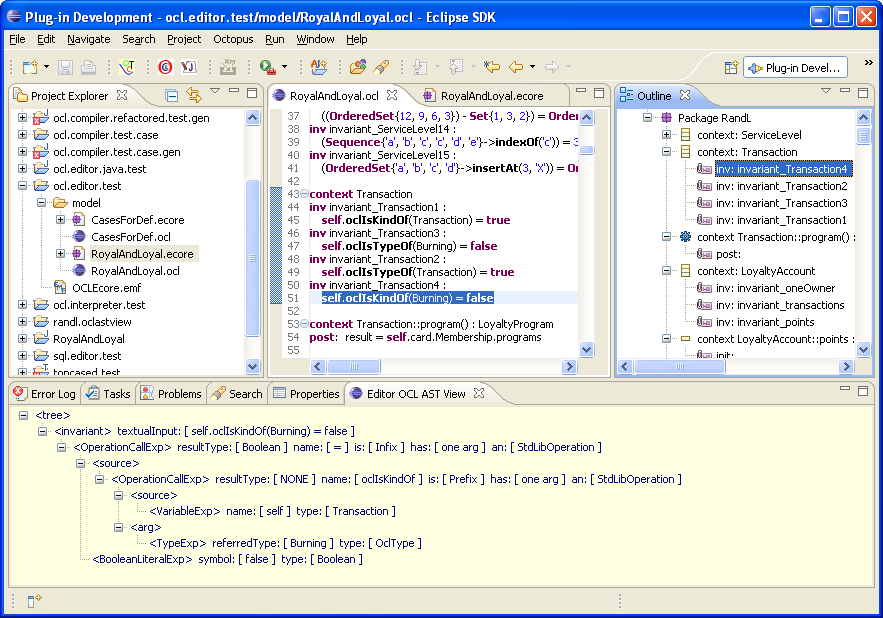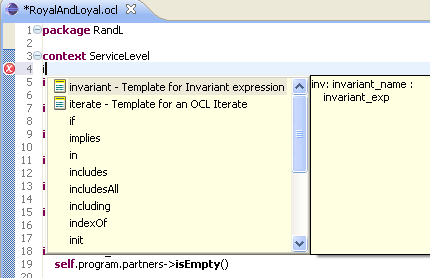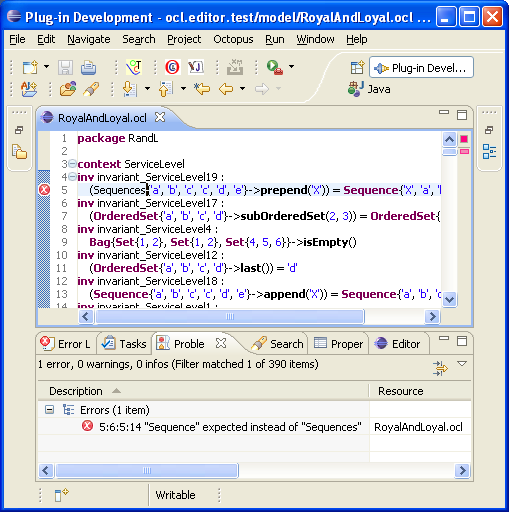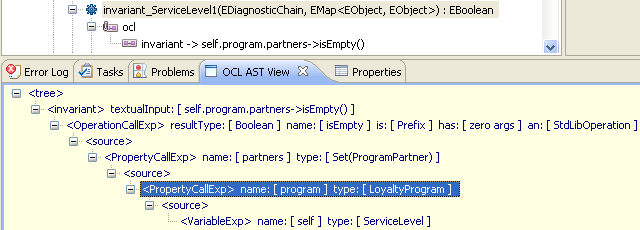Notice: This Wiki is now read only and edits are no longer possible. Please see: https://gitlab.eclipse.org/eclipsefdn/helpdesk/-/wikis/Wiki-shutdown-plan for the plan.
MDT-OCLTools
The MDT-OCLTools Project has closed. This page has been locked and is for Archival purposes only.
OCL Tools is a recently added component to the Model Development Tools (MDT) Project aiming at providing first-class support to modelers working with specifications containing expressions written in OCL, the Object Constraint Language. Such support includes editing, refactoring, code generation, execution, and interactive debugging of the OCL constraints given for some underlying (Ecore or UML2) class model. The functionality of OCL Tools builds upon the MDT OCL component, and has been seeded with two initial contributions:
- an OCL -> Java compiler, that as of now takes as input an .ecore and a textual file containing OCL constraints (handling UML2 is in the ToDo list). This compiler extends EMF code generation, producing Java 5 source code with side-effects-free methods for the given OCL invariants, pre- and postconditions, and derived attributes and operations.
- an OCL text editor, supporting usability features such as AutoCompletion, navigation by means of hyperlinks, structured views (for the outline of a document and for the Abstract Syntax Tree of an OCL constraint), among others. Although MDT OCL itself is completely fluent in both Ecore and UML2, only the Ecore binding is supported by the OCL text editor at this time.
A longer intro to OCL Tools can be found in the draft article being reviewed for publication at: https://bugs.eclipse.org/bugs/show_bug.cgi?id=204701
Contents
- 1 OCL Compiler
- 2 User Community
- 3 Best Practices
- 4 FAQ: Frequently Anticipated Questions
- 5 OCL Text Editor
- 5.1 Features supported
- 5.1.1 Syntax highlighting
- 5.1.2 AutoEdit 1
- 5.1.3 AutoEdit 2
- 5.1.4 Bracket matching
- 5.1.5 Content Assist
- 5.1.6 Current line highlighting and Show range indicator
- 5.1.7 Text Folding
- 5.1.8 Templates, customizable through Preference pages
- 5.1.9 Problem and Warning markers, "red squigglies"
- 5.1.10 Outline view
- 5.1.11 OCL AST View
- 5.1 Features supported
- 6 Related Links
OCL Compiler
What it does
In a nutshell, the compiler translates expressions like that in Listing 1 into what is shown in Listing 2:
context LoyaltyAccount inv invariant_points : self . points > 0 implies self.transactions->exists ( t | t.points > 0 ) |
public boolean invariant_points () {
Boolean implies1 = ( this . getPoints () > 0);
if (!( implies1 )) {
implies1 = Boolean . TRUE ;
} else {
Boolean exists2 = false ;
for ( RandL . Transaction t :
org.eclipse.ocl.util.CollectionUtil.asSet ( this . getTransactions ())) {
if (!exists2 ) {
exists2 = (t.getPoints () > 0);
}
}
implies1 = exists2 ;
}
return implies1 ;
}
|
How to use it
Step 1: Prepare an .ocl file
Step 2: Invoke the compiler
The compiler works ...
Step 3: Java code is ready
How to install
OCL Tools is known to apply to the following versions:
User Community
In order to foster the evolution of OCL Tools, user input is important. If you're using OCL Tools, please add yourself to this list, as a first step towards building a community. Literature reflecting best-practices is also welcome (and somewhat scarce as of now :-)
| Fernando Silva Parreiras | http://www.fernando.parreiras.nom.br/ |
| Abdelouahed Gherbi | http://www.informatik.uni-trier.de/~ley/db/indices/a-tree/g/Gherbi:Abdelouahed.html |
Best Practices
- Improving the Interoperability of Automotive Tools by Raising the Abstraction from Legacy XML Formats to Standardized Metamodels
http://www.springerlink.com/index/l7005436w7j5v14q.pdf - Überprüfung Syntaktischer Robustheit von Statecharts auf der Basis von OCL
http://rtsys.informatik.uni-kiel.de/~biblio/downloads/theses/kbe-dt.pdf
FAQ: Frequently Anticipated Questions
I invoke the compiler but no code gets generated. What can I do?
The OCL compiler should generate code when invoked with both
<yourFileName>.ecore
<yourFileName>.ocl
on the same folder. Moreover, the .ocl file should be of the form
package <packageName>
context <myClass>
...
endpackage
There is guidance about that in the exampled co-delivered with the source code, in plugin
de.tuhh.sts.ocl.example.royalandloyal
If all else fails, actually the shortest way to see why the compiled Java does not end up in .java files is to place a breakpoint at method
public void compile(IFile ecoreFile, IProgressMonitor monitor)
in class OCLCompiler in plugin de.tuhh.sts.ocl.compiler.emf.compiler
Actually, that's where the action is. The rest is just glue code so that those generated methods bodies are woven as part of EMF code generation (which generates method signatures, class skeletons, etc.)
The JET templates co-delivered with the OCL compiler override some hooks in the JET templates of EMF CodeGen, and when those templates change the hooks might not be there any more. For a discussion of this and what to do about it, take a look at:
http://dev.eclipse.org/newslists/news.eclipse.modeling.mdt.ocl/msg01379.html
OCL Text Editor
The big picture of the editor is:
Features supported
Among others, it supports the following:
Syntax highlighting
AutoEdit 1
Auto-completion of closing brace
AutoEdit 2
Upon typing a colon : and pressing Enter. A new indented line will be added, letting the
cursor ready for typing the body of the OCL expression.
Bracket matching
Content Assist
Current line highlighting and Show range indicator
Text Folding
Templates, customizable through Preference pages
File:OCLTools editor preference page.png
Problem and Warning markers, "red squigglies"

